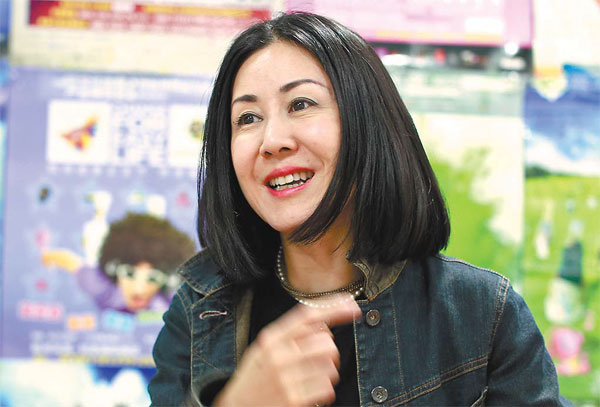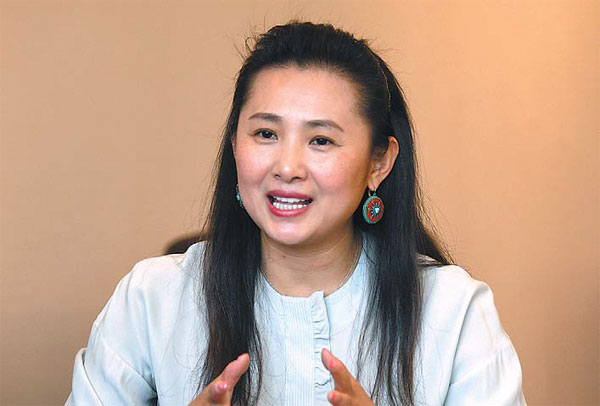Women on top (almost)
Updated: 2015-05-22 08:03
By Andrew Moody and Yu Hang(China Daily Europe)
|
|||||||||||
An increasing number of women are breaking the glass ceiling in China, especially in the private sector
Ma Yingying says women are increasingly making their mark in Chinese business. The 33-year-old chief executive officer and founder of Lux Shine Media Company, which stages modernized performances of Peking Opera, says there is now a complete break from the male-dominated business environment of the past.
"There are many excellent female entrepreneurs around me. I also see that more women are starting their own business in today's China."

"I think women have many natural advantages. They are detail-driven, they have great judgment and they have an innate sense of how to negotiate. In ancient China, women were supposed to follow their parents, husbands and children around. Not anymore."
Twenty years after Hillary Clinton addressed the United Nations Fourth World Conference on Women in Beijing on women's rights when she was First Lady of the United States, there is now evidence of women advancing in business life.
According to the 2015 Women in Business Survey by business advisers Grant Thornton, there are now more women in business leadership roles in China than many countries in the West.
Nearly a third (32 percent) of business leadership positions in China are held by women, compared with 20 percent in the US.
China is, in fact, ahead of all major European economies, with Italy on 24 percent, France 23 percent, the United Kingdom 20 percent and Germany 16 percent.
African countries, although faring well by international standards, are also behind China, with Botswana on 30 percent, South Africa 28 percent and Nigeria 21 percent.
Latvia is the most female friendly, with 40 percent of its business leaders being women, closely followed by Russia on 39 percent in second place.
Former TV presenter Ma, who was speaking in her offices at the Kun Tai International Plaza in Beijing, says there has been a change in attitude in China as the economy has opened up.
"I do believe that marriage and family are not the only way women can show value now. The female of the 21st century is becoming more and more independent. They too can work independently and realize their potential, as men have done in the past."
Dominic King, global economics and research manager at Grant Thornton in London, who worked on the Women in Business research, says women have tended to perform better in countries where there has been a Communist legacy. Chairman Mao himself said: "Women hold up half the sky," in 1952, referring to their economic utility.
"I think that is the case with Russia and the eastern European countries and probably China as well. There was this Communist idea of getting women out working and making sure they were productive units of labor.
"Women from eastern Europe, in particular, are much more likely to study maths and engineering than their counterparts in the US, for example."
King believes that another factor in women playing a strong role in management in China is strong childcare infrastructure networks that are common in emerging market economies.
"People tend to stay near their families so their parents can look after the children, enabling women to go out to work. What we are seeing in China is these extended family units breaking down with people moving to the cities. This might make things more difficult for women in the future."
However, at the Media Creative Park, entrepreneur Scarlett Li says China is not necessarily such a benign environment for female entrepreneurs.
The 43-year-old founder and CEO of Zebra Media, which stages high-profile musical festivals, insists she has often faced open prejudice.
"I had dinner recently with a man from a very famous venture capital company in China and he told me straight to my face that he would not invest in any female-led business," she says.
"It is not the first time this has happened either. The first time was from a woman venture capitalist. At least they said it to my face. If I meet with another 20 VCs, they might not give me the real reason."
Li accepts such reactions are not necessarily discrimination but purely commercial.

"I think it comes down to economic calculation. They are working on the assumption that at some point you might have children, so the business won't be your main focus.
"You have to be strong in China as a female executive because your mother, your family and your peer group will tell you your main responsibilities are marriage and children."
Ma Li, associate professor of organizational management at Guanghua School of Management at Peking University, says economics factors can still play a big part.
"When employers are thinking from a pure economics perspective, it is better to hire males than females because females on the whole are going to work less than males because at some point they are going to have babies and a career break."
Paid maternity leave is 98 days in China, compared with 16 months in Sweden and 12 to 14 months in Germany, where it is possible for women to take up to three years' leave, if part of it is unpaid.
King at Grant Thornton says there may be an inverse correlation between the length of maternity leave and female advancement, with Germany having one of the lowest proportions of women in leadership positions at 16 percent.
"If someone takes three years away from work, there is a real danger of them falling behind in skills and there is also the issue of whether someone really wants to go back into the workplace after that sort of break."
In China many women now have prominent roles in business and feature in the Fortune Top 50 Most Powerful Women in Business internationally.
These include Dong Mingzu, chairman and president of Gree Electric Appliances, the world's largest air conditioning business.
The Zhuhai, Guangdong, business was formed in 1991 and is now one of China's top 100 listed companies, with sales revenue of $19 billion (17 billion euros).
Another leading woman is Zhang Xin, chief executive officer of real estate developer Soho China.
The company has ambitious developments designed by renowned architect Zaha Hadid and co-owns the GM Building in Manhattan.
In the Grant Thornton research, however, China does not fare so well in terms of the proportion of women in senior management occupying the role of chief executive officer.
Only 7 percent of them get the top job, which is higher than the 6 percent in either the UK or the United States, but is well behind Germany on 11 percent and the 14 percent achieved by Italy and France.
Nearly a quarter of women senior managers (23 percent) are chief financial officers, compared with 19 percent in the UK, 9 percent in Italy, 6 percent in Germany but behind France on 26 percent.
China on this criterion has a similar score to the overall BRICS countries average of 22 percent.
"From our research this seems part of the tradition in many emerging market countries, where women are often responsible for running the household budgets," adds King.
Over on her 10th-floor offices in the 3-billion-yuan building that her company owns, there can be no doubt than Yang Yaning is one of China's most successful and wealthiest younger businesswomen.
Formerly a TV presenter, she is chairman of Hong Kong Key Point Capital Group, which apart from real interests owns Huxi Island, one of China's leading organic farming brands.
She believes that women have a better ability to rise through companies than is often assumed.
"You do have this problem of women leaving their jobs forever to have families, but the ones who return or stay often have more staying power than men. When men get to a certain level in a business in, say, their 30s they often leave and set up their own business, sometimes because they find it easier to raise capital than women.
"Women tend to stay around, and often as a result get promoted to senior positions."
Yang says that because of the family planning policy, married women over 30 in China are extremely employable, and she often hires them.
"The obvious point is that having just one child is not such a big interruption. They can return after they have their baby and resume their careers. The one-child policy also makes it possible for four grandparents to take care of just one grandchild so mothers have the time to focus on their careers."
Paul McGuinness, professor in the department of finance at the Chinese University of Hong Kong and co-author of a report, CEO Gender, Executive Compensation and Firm Performance in Chinese-listed Enterprises, believes women have benefited greatly from the development of the private sector and a more market-oriented economy.
"If you look at the figures for the period from 2000 to 2008, you see that female participation in private companies is rising quite significantly. On the other hand, in state-controlled firms it remains static at between 3 and 4 percent," he says.
"All the established evidence points to competition blunting discriminatory practice. What we see in China is the private sector and not the state pushing women into the higher echelons of management."
One of the big questions is whether women are any better at business than men.
Ma, who is also a visiting scholar at the Kellogg School of Management and who was speaking from Chicago, says that women should be better at doing deals because they are often more intuitive.
"They are better at understanding emotions so they should have more of a sense of what the other party in deal wanted.
"The problem is that they are more ethical so they are less likely to cheat in a negotiation by saying something that is not true, like that they have other offers on the table. This tends to negate any advantage they might have."
For Li at Zebra Media, which has recently launched ShowTime, a new digital platform for artists to show off their talent, says China's male business culture remains a challenge.
"Male entrepreneurs will just take their clients to a KTV (karaoke) bar where there are girls and they just drink and have a sauna. I can never do that sort of bonding, so to succeed essentially I have to provide a better product and service."
She comes from a line of strong successful women with her grandmother having taken over the family cooking oils business in Wuxi in Jiangsu province in last century.
"You have to fight to become a successful businesswoman in China. The culture programs you to be on a mission to get married from age zero. I am not in the normal spectrum. I grew up in a family that was different. My mother was divorced twice, and being single works for me and for my career."
Contact the writers at andrewmoody@chinadaily.com.cn
|
Hillary Clinton made a landmark speech on women's rights in Beijing when she was First Lady in 1995. Provided to China Daily |
|
Ma Yingying, chief executive officer and founder of Lux Shine Media Company. Wang Zhuangfei / China Daily |
|
Scarlett Li, founder and CEO of Zebra Media. Feng Yongbin / China Daily |
|
Yang Yaning, chairman of the Hong Kong Key Point Capital Group. Wang Zhuangfei / China Daily |
(China Daily European Weekly 05/22/2015 page1)
Today's Top News
Premier Li urges harnessing China's manufacturing prowess
OPEC turn down Chinese requests for extra oil
Beijing concerned as US accuses 6 Chinese of economic spying
Ma backs female entrepreneurs
China, Brazil launch new era of economic relations
China jumps 28 positions in global tourism competitiveness ranking
Xiaomi debuts in US, Europe with online store
Milan Expo highlights need to ensure healthy, safe, sufficient food for all
Hot Topics
Lunar probe , China growth forecasts, Emission rules get tougher, China seen through 'colored lens', International board,
Editor's Picks

|

|

|

|

|

|










